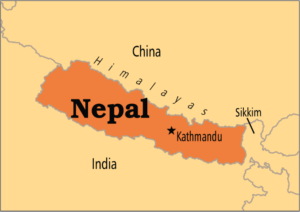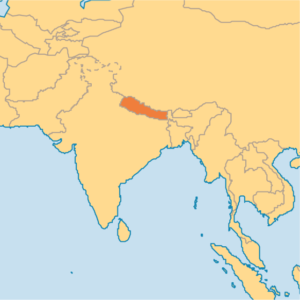SEPTEMBER 13 – TODAY’S READING FROM THE ONE YEAR BIBLE- ISAIAH 12:1-14:32; 2 CORINTHIANS 13:1-14; PSALM 57:1-11; PROVERBS 23:9-11.
TODAY’S READING FROM THE OLD TESTAMENT- ISAIAH 12:1-14:32
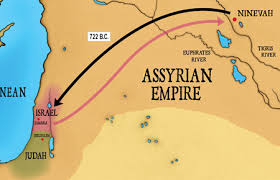 The series of prophecies that began in Chapter 7 comes to an end in Chapter 12. The prophecies began with a series of judgments upon God’s people. First, he gave a prophecy to King Ahaz about God first preserving Jerusalem from the threatened invasion of Syria and Samaria. Then he prophesies how Syria and Samaria will be swept up by the Assyrians, which will come like a flood. The invasion is likened to a mighty river overflowing its banks, submerging and spilling over the banks of the northern kingdom and flooding the fields of Judah up to the walls of Jerusalem (8:1-10).
The series of prophecies that began in Chapter 7 comes to an end in Chapter 12. The prophecies began with a series of judgments upon God’s people. First, he gave a prophecy to King Ahaz about God first preserving Jerusalem from the threatened invasion of Syria and Samaria. Then he prophesies how Syria and Samaria will be swept up by the Assyrians, which will come like a flood. The invasion is likened to a mighty river overflowing its banks, submerging and spilling over the banks of the northern kingdom and flooding the fields of Judah up to the walls of Jerusalem (8:1-10).
But if King Ahaz learns to fear the Lord, he need not fear anything else. If he would esteem the Lord as his rock and sanctuary, he will know deliverance. If he refuses, the Lord will be his stone of offense and stumbling, executing punishment.
King Ahaz and the people of Judah are warned of their unholy alliances with the occult (8:19). The nightfall of judgment is coming, but it will be followed by the dawn of deliverance.
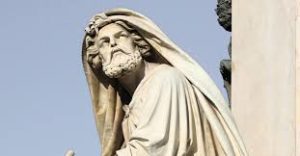 Isaiah prophesies the kingdom of the Messiah, who will bring light even to the downtrodden Galilee of the Gentiles. The zeal of the Lord of hosts will do this (9:7).
Isaiah prophesies the kingdom of the Messiah, who will bring light even to the downtrodden Galilee of the Gentiles. The zeal of the Lord of hosts will do this (9:7).
The nightfall of judgment must come first (9:8-19). God will use Assyria as his instrument of chastisement against the northern kingdom and then afterward punish Assyria. The southern kingdom would be taken into captivity in Babylon, but afterward, a remnant shall return.
In the perfect time, a shoot will come out of the stump of the chopped-down tree of the Davidic dynasty. This shoot will become a fruitful branch, the true vine, who will establish His kingdom on the earth (Isaiah 11).
 Chapter 12 reads like a Psalm. It begins, “In that day,” referring ultimately to the reign of Christ. The Day of the Lord started with the sundown bringing the darkness of judgment. This is followed by the day of restoration, and in the ‘far-sighted view,’ the Kingdom of our God and of His Christ. The nighttime of tribulation is over. The Lord Jesus is on the throne and reigning in His kingdom. And He is their strength and song! Rather than beating their breasts at Jerusalem’s Wailing Wall, the Jews are singing praises to the Triune God of their salvation!
Chapter 12 reads like a Psalm. It begins, “In that day,” referring ultimately to the reign of Christ. The Day of the Lord started with the sundown bringing the darkness of judgment. This is followed by the day of restoration, and in the ‘far-sighted view,’ the Kingdom of our God and of His Christ. The nighttime of tribulation is over. The Lord Jesus is on the throne and reigning in His kingdom. And He is their strength and song! Rather than beating their breasts at Jerusalem’s Wailing Wall, the Jews are singing praises to the Triune God of their salvation!
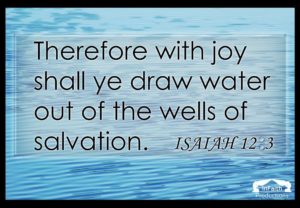 The Holy One of Israel is in their midst! The inhabitants are calling upon the only name under heaven given to men that they might be saved (Acts 4:12). The covenant people of God are drawing from the wells of salvation in the Name of Jesus.
The Holy One of Israel is in their midst! The inhabitants are calling upon the only name under heaven given to men that they might be saved (Acts 4:12). The covenant people of God are drawing from the wells of salvation in the Name of Jesus.
Chapter 13 starts a new section of 11 chapters in the Book of Isaiah (13-23). Isaiah will give 9 somber prophecies of judgment (called ‘burdens’) concerning the nine surrounding nations, starting with Babylon.
Once again, we will see that these prophecies can be seen through different lenses. First, there is the more immediate, local application. These prophecies were fulfilled. Then there are the long-range prophecies; some have yet to be fulfilled. We also have an x-ray lens that enables us to see into the unseen realm of spiritual realities and the conflict of the Kingdoms of Light and Darkness, the rule of God, and the rule of Satan.
The first ‘burden’ concerns Babylon. At the time of the prophecy, Babylon was not yet considered a world power. The inspiration of Scripture can be seen in the prophet’s accurate reading of history.
 The city of Babylon became the center of the Babylonian Empire under Nebuchadnezzar (607- 571 BC). Babylon became the largest city of its day. Its name means, ‘gate of the gods’.
The city of Babylon became the center of the Babylonian Empire under Nebuchadnezzar (607- 571 BC). Babylon became the largest city of its day. Its name means, ‘gate of the gods’.
In 539 B.C., it fell to Cyrus the Great of Persia. It will be rebuilt, and in the Book of Revelation, Chapters 17 and 18, Babylon is portrayed as a symbol of religious, governmental, and commercial rebellion against God and is under the rule of the antichrist.
Under the immediate and local application of the prophecy, Babylon will be raised up and ‘set apart for use’ by God as an instrument to bring judgment upon the southern kingdom of Judah. They are called ‘sanctified ones’, meaning set apart for God’s use (13:3). They will be weapons of His indignation (13:5) and bring destruction to the whole land, including Jerusalem and the temple.
The nighttime aspect of the Day of the Lord is coming.
Isaiah 13:9 9 Behold, the day of the LORD is coming, Cruel, with fury and burning anger, to make the land a desolation; And He will exterminate its sinners from it.
The long-range lens gives us a picture of the Tribulation period described in Daniel and the Book of Revelation. Notice the global, rather than local, aspect pictured here.
Isaiah 13:10-11 10 For the stars of heaven and their constellations Will not flash forth their light; The sun will be dark when it rises and the moon will not shed its light. 11 Thus I will punish the world for its evil and the wicked for their iniquity; I will also put an end to the arrogance of the proud and abase the haughtiness of the ruthless.
The short-range, local lens accurately predicts that Babylon will be overtaken by the Medes and Persians.
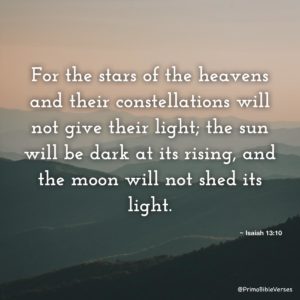 Isaiah 13:17 17 Behold, I am going to stir up the Medes against them, who will not value silver or take pleasure in gold.
Isaiah 13:17 17 Behold, I am going to stir up the Medes against them, who will not value silver or take pleasure in gold.
However, aspects of this prophecy have yet to be fully realized, or they were fulfilled in ways that are not clear. Isaiah 13:19-22 refers to its utter destruction and that it will be abandoned. There are ruins of ancient Babylon today and attempts made to build upon it.
However, when the Medo-Persian King Cyrus conquered Babylon, the city itself was not destroyed. It was not until long after the Persians were conquered by the Greeks, under Alexander, that the inhabitants of Babylon were deported to Seleucia that Babylon became a relatively insignificant city. So there is further fulfillment to come to these prophecies.
As Isaiah continues to prophesy against Babylon in Chapter 14, he touches on a larger theme of the origin of evil, its judgment, and final removal.
In this chapter, we see the battling forces of light and darkness, of heaven and hell. We see the judgment of God executed upon evil and the kingdom of God established with all enemies removed. The scope extends beyond the immediate and local judgment of Israel’s neighbor, Babylon.
The result of the final judgment at the end of the age will be:
Isaiah 14:7 7 “The whole earth is at rest and is quiet; They break forth into shouts of joy.
Heaven will reign on the earth, and hell will receive those who remain in rebellion against God.
Isaiah 14:9 9 “Sheol from beneath is excited over you to meet you when you come; It arouses for you the spirits of the dead, all the leaders of the earth; It raises all the kings of the nations from their thrones.
The Babylonians, in their pride, will one day think they stand above the stars. This is true of the Kings of Babylon. When we look at the pride that rules the hearts of the Babylonian rulers through the x-ray of the prophetic word, we can see the rebellion of Lucifer, the light bearer, who became Satan, the Adversary.
Keep in mind that Isaiah is not specifically speaking of Satan here but describing an earthly king. This could possibly be Sennacherib of (705-686 BC) who was the king of Assyria when Babylon was overthrown in 689 B.C. Assyrian kings Tiglath-Pileser, Sargon, Sennacherib, were given the honorary title of “King of Babylon”.
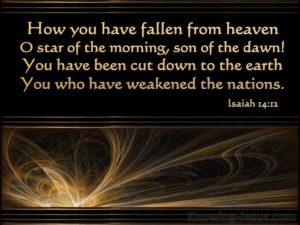 Isaiah 14:12-15 12 “How you have fallen from heaven, O star of the morning, son of the dawn! You have been cut down to the earth, you who have weakened the nations! 13 “But you said in your heart, ‘I will ascend to heaven; I will raise my throne above the stars of God, And I will sit on the mount of assembly In the recesses of the north. 14 ‘I will ascend above the heights of the clouds; I will make myself like the Most High.’ 15 “Nevertheless you will be thrust down to Sheol, To the recesses of the pit.
Isaiah 14:12-15 12 “How you have fallen from heaven, O star of the morning, son of the dawn! You have been cut down to the earth, you who have weakened the nations! 13 “But you said in your heart, ‘I will ascend to heaven; I will raise my throne above the stars of God, And I will sit on the mount of assembly In the recesses of the north. 14 ‘I will ascend above the heights of the clouds; I will make myself like the Most High.’ 15 “Nevertheless you will be thrust down to Sheol, To the recesses of the pit.
The princes of this world, like the leaders of Babylon, will be judged.
 Isaiah 14:22 22 “I will rise up against them,” declares the LORD of hosts, “and will cut off from Babylon name and survivors, offspring and posterity,” declares the LORD.
Isaiah 14:22 22 “I will rise up against them,” declares the LORD of hosts, “and will cut off from Babylon name and survivors, offspring and posterity,” declares the LORD.
The Prophecy Against Assyria starts in Chapter 14, verse 24.
It starts with a declaration of God’s sovereignty on display in all these judgments:
Isaiah 14:24-26 24 The LORD of hosts has sworn saying, “Surely, just as I have intended so it has happened, and just as I have planned so it will stand, 25 to break Assyria in My land, and I will trample him on My mountains. Then his yoke will be removed from them and his burden removed from their shoulder. 26 “This is the plan devised against the whole earth; and this is the hand that is stretched out against all the nations.
 Isaiah 14:27 27 “For the LORD of hosts has planned, and who can frustrate it? And as for His stretched-out hand, who can turn it back?”
Isaiah 14:27 27 “For the LORD of hosts has planned, and who can frustrate it? And as for His stretched-out hand, who can turn it back?”
The Prophecy Against Philistia (Palestine) (14:28-32)
The land on the western coast of the kingdom of Israel became populated by Philistines after the time of Abraham. By the time of the conquest of Canaan, they were enemies to contend with. This title for the southern kingdom reflects how His people have reverted to the ways of the pagans.
This prophecy is given in the year that King Ahaz died. Because Ahaz was an evil king, they might have thought their problems would be over. Despite the relative improvement of future kings, judgment against the southern kingdom was still on track.
He contrasts the corruption of the majority with the faithful remnant of Zion who put their trust in the Lord.
Isaiah 14:32 32 “How then will one answer the messengers of the nation? That the LORD has founded Zion, and the afflicted of His people will seek refuge in it.”
In other words, the chastening will serve its purpose and cause some to return to the Lord.
TODAY’S READING FROM THE NEW TESTAMENT – 2 CORINTHIANS 13:1-14
We learn from today’s reading that Paul had a third visit to Corinth planned (13:10).
He warns them that he means business and expects that the church leaders will rise to his challenge to implement healthy practices of church discipline. Spare the rod, spoil the church.
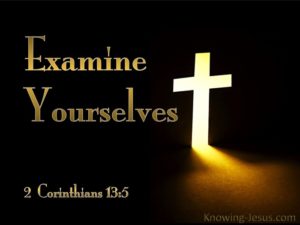 He reminds them not to make surface judgments based upon personality. Some perceived Paul as being strong while being away and writing letters but weak when making personal visits. He reminds them that the Almighty God was crucified in weakness, but His power remained intact. Paul does not boast in his natural abilities, but the new life and authority that is his in Christ Jesus.
He reminds them not to make surface judgments based upon personality. Some perceived Paul as being strong while being away and writing letters but weak when making personal visits. He reminds them that the Almighty God was crucified in weakness, but His power remained intact. Paul does not boast in his natural abilities, but the new life and authority that is his in Christ Jesus.
He asks them to test the authenticity of their faith:
2 Corinthians 13:5 5 Test yourselves to see if you are in the faith; examine yourselves! Or do you not recognize this about yourselves, that Jesus Christ is in you—unless indeed you fail the test?
True Christians, those that have been born from above by the Holy Spirit, will have a new nature, a new relationship to Christ, His Word, and His church. They will want to shun sin and pursue holiness.
In the Book of Romans Chapter 8, verse 9, Paul reminds them what it means to be a genuine Christian. Christians are no longer ‘in the flesh’, ‘in Adam’, ‘the old nature’, no longer ‘dead in their sins’. They are part of a new creation. Paul says, “You are no longer in the flesh if indeed the Spirit of God dwells in you. But if anyone does not have the Spirit of Christ, he does not belong to Him.”
This is what it means to be a Christian. Christians are those who have been regenerated by the Holy Spirit. The new root in their life will be evident by the new fruit, the fruit of the Indwelling Holy Spirit (Galatians 5:22-23).
 Paul concludes his letter expressing his positive expectations in prayer. (13:7-10). His prayer is that they will aim to be like Jesus. That they would mature in their faith, perfecting holiness in the fear of God. That they would be of one mind, experiencing the love and peace of the Lord.
Paul concludes his letter expressing his positive expectations in prayer. (13:7-10). His prayer is that they will aim to be like Jesus. That they would mature in their faith, perfecting holiness in the fear of God. That they would be of one mind, experiencing the love and peace of the Lord.
His benediction is one we would wish on all God’s people:
2 Corinthians 13:14 14 The grace of the Lord Jesus Christ, and the love of God, and the fellowship of the Holy Spirit, be with you all.
TODAY’S READING FROM THE BOOK OF PSALMS – PSALM 57:1-11
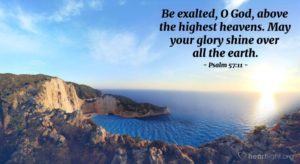 There are two parts to this Psalm. The first is one in which the Psalmist is desperately taking refuge in the Lord, His hiding place (Psalm 57:1-4). Here he cries out for mercy.
There are two parts to this Psalm. The first is one in which the Psalmist is desperately taking refuge in the Lord, His hiding place (Psalm 57:1-4). Here he cries out for mercy.
The second is where he is in a position of danger and yet his heart is steadfastly set on the Lord, resolutely offering Him praises in song.
Verses 5 and 11 contain the same refrain.
Psalm 57:11 11 Be exalted above the heavens, O God; Let Your glory be above all the earth.
TODAY’S READING FROM THE BOOK OF PROVERBS – PROVERBS 23:9-11
Proverbs 23:9-11 9 Do not speak in the hearing of a fool, for he will despise the wisdom of your words. 10 Do not move the ancient boundary or go into the fields of the fatherless, 11 For their Redeemer is strong; He will plead their case against you.
It is likely that you are wasting your breath, if you are instructing someone who has proven to continually reject wisdom. They often scorn anyone who seeks to change them.
Don’t even think about cheating someone of what is rightfully theirs (such as property marked by a boundary stone). God is a defender of the fatherless and will not let you get away with it. He will plead their case against you.
PRAY FOR THE NATIONS – NEPAL
Nepal
Asia
Geography
A mountainous Himalayan state between China (Tibet) and India. It contains 8 of the 10 highest mountain peaks in the world.
Population: 29,852,682 Annual Growth: 1.86%
Capital: Kathmandu
Urbanites: 18.2%
HDI Rank: 144 of 182 (UN Human Development Reports 2009)
Peoples
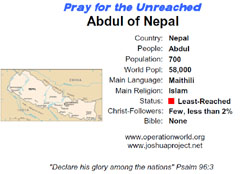 Peoples: 380 (93% unreached) All peoples
Peoples: 380 (93% unreached) All peoples
Unreached Peoples Prayer Card
Official language: Nepali Languages: 127 All languages
Religion
Largest Religion: Hinduism
|
Religion |
|
Pop % |
Ann Gr |
|
850,801 |
2.85 |
5.3 |
|
|
850,801 |
2.9 |
5.3 |
|
|
Hinduism |
22,392,497 |
75.01 |
|
Answer to Prayer
There is a church planted in every one of the 75 districts of Nepal, and there are at least some believers in almost every people and caste group.
Challenge for Prayer
Freedom of religion is guaranteed by law, but only in limited measures. Non-Hindus cannot proselytize. If they do, they risk fines, imprisonment, and, in the case of expatriates, expulsion. Despite this law, the Church in Nepal grows because of courageous evangelism. Hindu fundamentalists, as well as Maoists, often single out Christians; their non-violent nature and connections to the West make them soft targets. Pray for perseverance for believers, that neither laws of man nor threats of violence deter them from sharing the gospel.
https://prayercast.com/nepal.html
Eight of the world’s ten highest mountains can be found in Nepal’s Himalayan Mountains. Most notably, Mount Everest is the highest point above sea level in the world at 8850 meters (29,035 ft.). From its mountainous northern border with Tibet (China), Nepal’s topography falls to near sea level at its southern border with India on the Ganges River plain. Most of the over 36 ethnic groups in this South Asian country live in the central hill area and in the flatter and arid lowlands in the south. Nepal’s Sherpa guides of the Himalayas and the Gurkha military regiments are peoples recognized internationally for their skill and bravery.
Isolation and a long-ruling monarchy have contributed to Nepal being one of the poorest and most underdeveloped countries in the world. It is estimated that 25% to 40% of the Nepalese people live below the poverty line. Most of Nepal’s people are subsistence farmers, where geographic, environmental, and political factors have impacted the growth of agriculture as well as industry. Nepal ended its long line of monarchies by becoming a republic in 2008, yet political instability, civil strife, and labor problems continue.
As the world’s last remaining Hindu kingdom, over 80% of the Nepalese people are Hindu. Buddhists comprise around ten percent of the population. Religious freedom is legal under Nepalese law, but restrictions are imposed on non-Hindu groups. Christian believers are at risk for fines and even imprisonment for proselytizing. Though the percentage of Christians in Nepal is small, the number of believers is growing. Each of the 75 districts has a church plant and believers can be found in almost every people and caste group.
PRAYER: Be exalted, O God, above the heavens, and may Your glory fill all the earth! Truly Your Word can be trusted. Thank You for the warnings of Scripture of both the reality of judgment and the promised dawn of Your reigning in righteousness. We choose to seek first Your kingdom and serve Your purposes in our generation. May your truth be found governing our thoughts and motivating our wills today. May Your love and peace rule our hearts. In Jesus’ Name. Amen.
Pastor David

